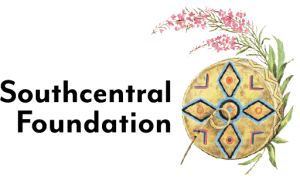Alaska Native Youth: Rising From 10,000 Years of Strength
By FWWI Learning and Development Advisor Lu-Anne Haukaas and FWWI Learning and Development Associate Polly Andrews
Southcentral Foundation’s Family Wellness Warriors Initiative employees connected virtually and enjoyed tea with Elder community members while listening intently to their wisdom and stories. As conversations with Elders often transpire, their attention turned to the next generation. Through Zoom videoconferencing, they encouraged this generation to create safe, healthy environments for the next generation to flourish, fully confident and deeply rooted in who they are.
Jim Labelle, Sr., University of Alaska Anchorage professor, said healthy adults must remind our youth that they have a community that is willing to be there, love them, and share in their pain. Labelle, an Inupiaq Elder, gave a gentle reminder of the power of sharing story: “talking is healing.” Labelle, who is also an expert in historical trauma and resilience, said that identity is rooted in the strength and knowledge of 10,000 years of Alaska Native brilliance, survival, and adaptability. He added, “If we can survive 10,000
years, we can survive this recent change.”
Labelle’s wisdom was echoed by Alfred Quijance, Elder advisor and
FWWI committee member, who said although times have changed, and ancient tradition has evolved. “We can still create environments that teach our youth about their sacredness, their purpose, and their responsibility to others,” said Quijance, who is a longtime SCF employee of Sugpiaq descent. He emphasized listening to youth in ways that are gentle and free of judgement is an important part of healthy relationships.
Learning about the customs and practices of Alaska Native culture is a way to teach this. “If we teach our youth how to eat their own natural food,” Quijance shared, “eventually they will hunt their natural food.” In this lies a shared responsibility for the community to come together in ways that support our youth and end cycles of abuse. This is not a new concept, but one that knows the whispers of ancient days. Traditionally, Quijance said, the whole village stepped in to care for the family when a serious issue arose. Still today, strength has its source in community and relationship.
When asked what a shared responsibility looks like in our modern time, SCF Vice President of Executive and Tribal Services Ileen Sylvester, a Tribal member of the Native Village of Ekwok, reminisced about her childhood. She remembers as a young girl, her father returning home from the fishing boat. “When he was home, he would sit us down on the couch and talk to us about life,” she said. Shared responsibility to Sylvester includes leaders who are willing to stand out front and use their voices while modeling healthy community for youth. “Today my siblings and I laugh when we notice that we’re doing the same thing with our children and grandchildren.”
SCF’s RAISE Program, designed to develop leadership skills in Alaska Native and American Indian youth 14 – 19 years old, is one of many programs that Sylvester oversees. Alaska Native and American Indian youth are uncovering their voices and exploring their futures. “If we could surround them with support and let them know we believe in them and their goals, it can change a young person’s life,” said Sylvester, who is a Yup’ik, Athabascan and Aleut descendant.
She highlights that part of the success of the program is bringing together a community of youth interns and Alaska Native leadership representing diverse backgrounds and experience, to model the picture of success. “We’ve been able to connect the generations, bring everyone together, build relationships, and lifelong relationships.” From this, Sylvester has seen many intern alumni move on to higher education and leadership positions throughout SCF and credits the program’s whole-person wellness approach to supporting youth. “It’s the physical, mental, emotional, and spiritual wellness that we help instill in our youth. It takes all of that to change our future.”
While the future may seem uncertain at times, what is certain and unshaken is the 10,000-year-old foundation Elders and ancestors have given us. By sharing responsibility, by sharing our stories, we ensure that foundation lasts for generations to come.

